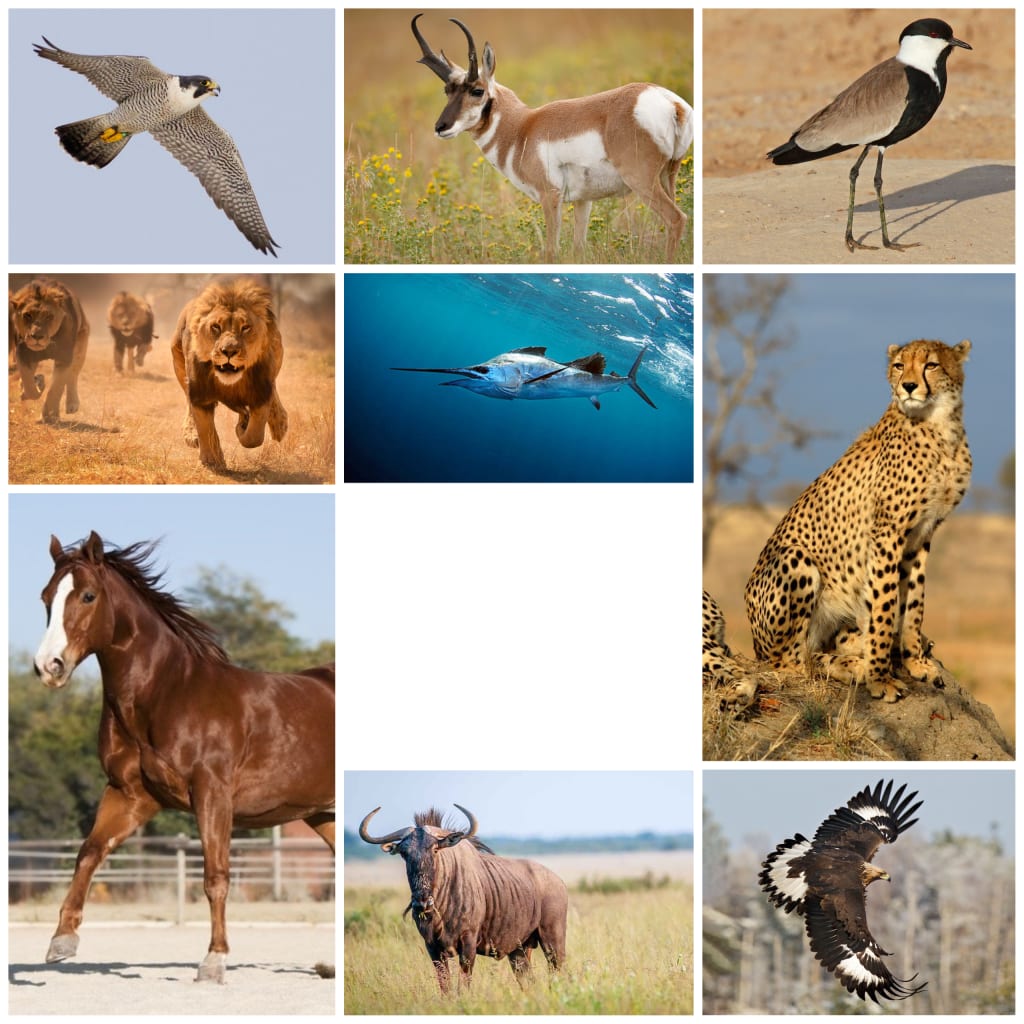10 fastest animals on this planet
speed is essential for survival

Introduction.
How fast can a human being run? Research shows that human beings can run as fast as forty miles an hour, but the sprint speed is approximately 13 miles an hour. However, a 13-mile-per-hour sprint is not sufficient to win a race with some of the fastest animals in the world in the wild, where speed is essential for survival. A predator must run faster than its prey or it dies of hunger, and the prey must run faster than the predator or it becomes a meal. The slowest animals have to be smart enough to outwit their predators. Here are ten of the fastest animals on this planet.
Number 10.
lieth top speed 50 miles per hour. The lion is an extremely social animal that lives in a group called pride. A lion pride can contain 15 to 40 members. They also hunt in the group, which increases the success rate during chasing. A lion can attain a maximum speed of 50 miles per hour, but they can only keep this pace for a short distance.
Number 9.
Wildebeest top speed 50 miles per hour Blue wildebeest are grass-eating mammals native to South and East Africa. They grow to a height of 1.3 meters. Their strong legs and shoulders help them gain speeds of up to 50 miles per hour. Their speedy movement helps blue wildebeest find shelter from predators and makes migration easy. They're normally found in groups and migrate in the dry season to wetlands to search for grass.
Number 8.
quarter horse top speed 55 miles per hour The quarter horse is one of the oldest horse breeds in the United States. It is known for its speed, agility, and performance; even its name refers to its capabilities. The name quarter horse comes from the horse's success in racing across quarter-mile courses in the 17th century. The quarter horse could outpace other famous racing breeds such as the Arabian or thoroughbred, and given that the quarter horse can reach speeds up to 55 miles per hour, it's not hard to see how, as its name suggests, it can't maintain the speed for too long, but for short sprints, there's no faster horse in the world.
Number 7.
Springbok top speed 55 miles per hour Springbok are exceptionally fast and can attain speeds of 55 miles per hour. They can also make sharp turns when running and jump up to 13 feet in the air. They are antelopes belonging to the gazelle tribe and can be found in southern Africa. Their names come from the Afrikaans and Dutch words for spring, meaning jump, and Bock kamini, a male antelope or goat. They don't have great endurance over long distances. The springbok is also the national symbol of South Africa.
Number 6.
pronghorn antelope top speed 61 miles per hour The pronghorn antelope is a native North American animal that can run very long distances at a speed of 61 miles per hour. Unlike other fast-moving animals, pronghorn antelope have the ability to run fast at the same time and can travel long distances without getting tired. Pronghorn antelope grow up to a height of 3 feet and have very strong legs and shoulders. Pro-born antelopes make a 300-mile migration in different seasons.
Number 5.
Sailfish top speed: 70 miles per hour There is somewhat of a quandary concerning the fastest animal in the ocean. Some researchers say the sailfish, while others say the black marlin, can reach speeds of around 70 miles per hour. Others would also put swordfish in this category, suggesting that they can reach similar speeds. Sailfish have very prominent dorsal fins, which give them their name. They're typically blue to grey in colour with a white underbelly. In addition to their speed, they're also known as great jumpers. They eat smaller fish, like anchovies and sardines.
Number 4.
Cheetah top speed 75 miles per hour The fastest animal on land is the cheetah. Cheetahs can get up to approximately 75 miles per hour. Interestingly, the chases for prey by cheetahs meet success within 40 to 60 seconds. Cheetahs use their tails to steer in the right direction. Cheetahs can get up to approximately 75 miles per hour. Interestingly, the chases for prey by cheetahs meet success within 40 to 60 seconds. Cheetahs use their tails to steer in the right direction. The prey of cheetahs has to have a number of adaptations to try to avoid the speedy predator on the Savannah. Cheetahs typically eat gazelles and other similar-type animals.
Number 3.
spur-winged goose top speed 88-mile-per-hour spur-weight The goose is the largest group in the goose family native to South Africa. It is 40 inches long and weighs up to eight kilograms. These geese can fly at a maximum speed of 88 miles per hour and are mainly found in wetlands on the banks of rivers and lakes in Africa. The spurring goose also makes a migration ranging to several hundreds of kilometers in different seasons.
Number 2.
Golden Eagle top speed 200 miles per hour This large and powerful bird of prey is the second-fastest creature on earth. They're known for flying to great heights and for astonishing speed during a dive to catch prey. This amazing bird achieves an outstanding speed of 200 miles per hour. It's the sharp talons and the amazing speed of the dive that helped Golden Eagles catch their prey.
Number 1.
peregrine falcon top speed 240 miles per hour The absolute fastest animal on the planet is the peregrine falcon. It is both the fastest animal on the planet and the fastest bird. It can reach speeds of over 240 miles per hour when it dives. The falcon is a very adept hunter, due in large part to its tremendous diving speed. Peregrine falcons typically eat other birds but have been observed eating small reptiles, animals, and, under certain conditions, insects.
Conclusion
who determines the ten fastest animals on the planet if any of these animals on the list surprised you or if you think there should be another animal please leave a comment under which animal and why
About the Creator
Durga Prasad
My "spare" time is spent creating for myself and writing for others.





Comments
There are no comments for this story
Be the first to respond and start the conversation.